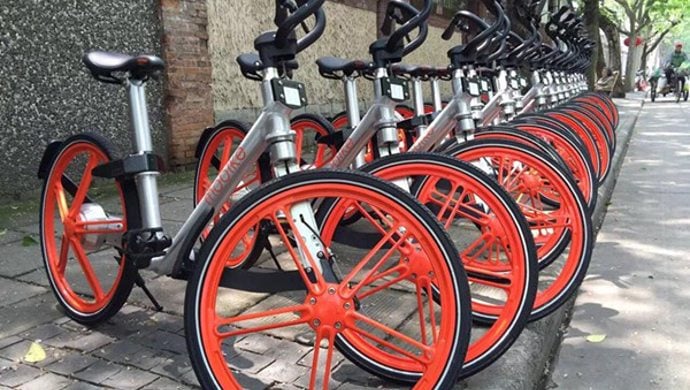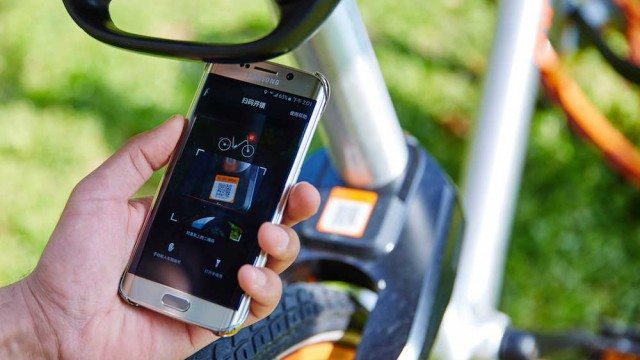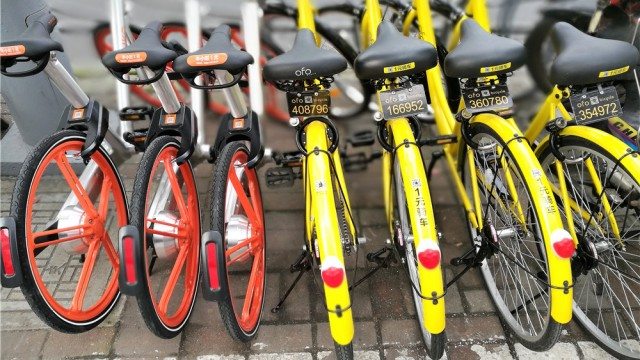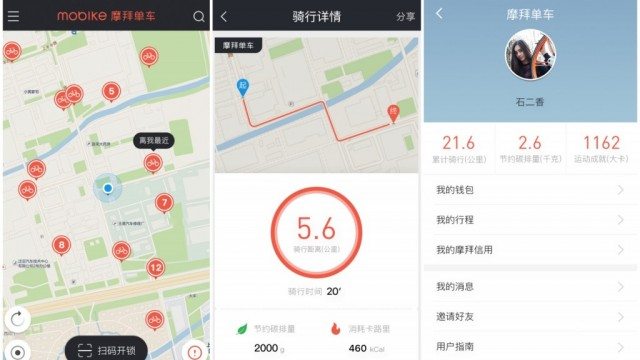Here’s how Mobike hopes to differentiate itself from other bike-sharing companies

Mobike’s bikes lined up on the streets (Source: Mobike)
Bike-sharing has been spreading like wildfire as different companies and backers enter the field. TechNode has already taken a look at the bikes from the users’ perspective. However, this is only one side of the story: these companies differentiate themselves not just by user experience, but also in business model.
Technode interviewed Joe Xia, founder and CTO of Mobike, to gain insight into the theory behind the bikes.
Mobike claims to be part of the sharing economy along with companies like Airbnb and Uber. However, you don’t actually faciliatate people sharing what they own, manufacturing your own bikes instead. How do you respond when people say you’re more like a B2C rental service?
Mobike is indeed part of the sharing economy. First, I think we need to to rethink the concept of sharing economy. If you say only the format of person giving one’s asset to another person fits the concept of sharing economy, it is too narrow.
In my opinion, any format that promotes sharing a single asset among more than one person is sharing economy. This model places more weight on ‘usership (right to use)’ of more people than one individual’s ownership of an asset. Overall, this decreases resource waste and increases efficiency of using resources.
Also Read: Bandung to get city-wide bike-sharing system: A first in Indonesia
Although Mobike’s bikes are manufactured in our own factory, every single bike is shared among so many different people, being used whenever and wherever they want. With the Mobike platform, people do not have to waste money buying their own bike.
But isn’t the hotel industry structured in the same way?
They are totally different. The key to a sharing economy is to expand the right to use for multiple individuals by removing ownership of one resource. On the other hand, hotels have the right to own property at a high price and no one room is shared by several people. You can not prevent it from being wasted when not in use.

Mobike’s bikes are equipped with smart lock (Source: Mobike)
What would be the appropriate way to define Mobike? Is it a hardware company that produces bikes, or is it a software company or a platform company that focuses on mobile apps?
Mobike is, in a word, a technology company. Technology is at the heart of the company, covering hardware, software, and platforms.

Mobike’s bikes are orange. Ofo’s bikes are yellow. (Source: Baidu)
This September, Chinese ride-hailing giant Didi Chuxing (“Didi”) announced that it has invested “tens of millions” of US dollars into Ofo, the main competitor of Mobike. Some say this deal represents part of a “multi-layered partnership” in the urban mobility realm. What do you think?
Mobike believes that investment is something more than just financial support; it means a strategic alliance with the investor. In that sense, Didi was not the best investor for Mobike, since Mobike has a competely different business model from Didi.
Also Read: Mobike to test trial bike-sharing app in Singapore this year
Didi is a driver-to-person, that is, a person-to-person model. Passengers use the Didi app to call taxi drivers or individual drivers. In other words, Didi connects one individual, the car-owner, to another individual, the passenger.
Besides bike-car difference, how is Mobike different?
Mobike is not a person-to-person link, but a model that connects a bike to a number of different individuals, therefore, person-to-thing. In other words, it is an Internet of Things (IoT) business that connects all the people to a single object.

Screenshot of the Mobike App (Source: ecmoban)
What do you think is Mobike’s strength as IoT platform?
First is that in the IoT ecosystem of Mobike, the “thing” is mobile. In the home IoT, the “thing” that connects everything is immobile. This, in fact, creates a significant difference in how much data is generated from this connection. Compared to bikes that move around all day and are used by a number of different people, home IoT devices accumulate a relatively small amount of data only intermittently.
Second is that the connection is with multiple individuals. Let’s compare with car IoT. While in Mobike’s platform, a single bike is shared by many people, car IoT is connecting one individual with a single car, which means data is much more limited than Mobike.
It seems that Mobike’s bikes are not just bikes as mere transportation tools.
Yes. That is the reason why Mobike largely invests in the technology of the bike itself. It is the central axis for the Mobike’s pursuit of the person-to-thing model.
—
The article Mobike to become moving IoT: Q&A with Joe Xia, founder and CTO of Mobike was first published on TechNode.
The post Mobike to become moving IoT: Q&A with Joe Xia, founder and CTO of Mobike appeared first on e27.